IUJ-JICA Ogata Research Institute Knowledge Forum: State, Economic and Human Security in a World Facing Compounded Crises
2023.02.01
JICA Ogata Sadako Research Institute for Peace and Development (JICA Ogata Research Institute) and the International University of Japan (IUJ) jointly hosted the Knowledge Forum “Security and Development Cooperation in a World Facing Compounded Crises: The Impacts of the Ukraine Crisis and State, Economic and Human Security” online on Dec. 16, 2022.
The forum opened with remarks from Kayashima Nobuko, senior research advisor, JICA Ogata Research Institute. Kayashima noted that the Russian invasion of Ukraine started amidst lingering socioeconomic consequences of the COVID-19 pandemic and concerns around delays in efforts to address existing challenges like climate change. She then remarked that in this forum, experts will discuss measures to enhance and maintain resilience during compounded crises from perspectives of state, economic and human security.
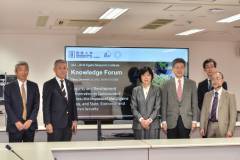
Panelists pose for a group photo
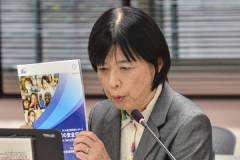
Kayashima Nobuko, senior research advisor, JICA Ogata Research Institute
In the panelist presentation session, Yamaguchi Noboru, distinguished fellow, JICA Ogata Research Institute (also a professor at IUJ), talked from state security perspectives. By comparing the course of events during the interwar period (i.e., the years from the end of World War I until the start of World War II) in Japan with the situation in Ukraine today, Yamaguchi mentioned that Russia’s initial plan was unrealistic and the country’s political-military relationship may not have been a very healthy one. He then added that Russia likely has not reached the point of no return yet and may have another chance to think again. Furthermore, Yamaguchi raised the following as factors that are allowing Ukraine to fight back well: leadership exerted by President Zelenskyy, introduction of smart weapons, and military assistance from NATO member states in terms of both human resources and hardware.
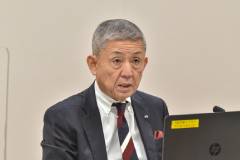
Yamaguchi Noboru, distinguished fellow, JICA Ogata Research Institute
Takahara Akio, executive director, JICA Ogata Research Institute, followed with a presentation on China’s position with regards to the Ukraine situation from perspectives of international politics (modern Chinese politics). China made the decision to raise “questions and concerns” in September although their government had expressed support for Russia immediately after the start of the invasion in February 2022. Takahara raised the following as the factors behind this: counteroffensives by Ukrainian forces; political maneuvering before the National Congress of the Communist Party of China in response to criticism from within the country; and political consideration toward Europe with a view to overcoming domestic economic hardships caused by the “zero-COVID” policy.
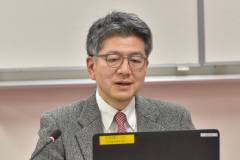
Takahara Akio, executive director, JICA Ogata Research Institute
Next, Tadokoro Masayuki, specially appointed professor at IUJ, gave a presentation from perspectives of international political economy. Tadokoro said that the Russian invasion of Ukraine was a decisive step in the change from an era of market-centered globalization to an era in which states have large roles in the global economy: we are moving into an era in which stability and resilience are more emphasized than efficiency and growth. He then noted that Global South nations like Turkey and India are taking nuanced positions with regards to the economic sanctions on Russia. Tadokoro added that nations will look out for trustworthy partners and rebuild economic and political relationships with one another, meaning that complex diplomatic exchanges may continue between them.
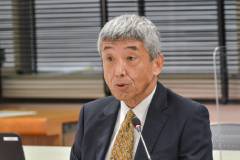
Tadokoro Masayuki, specially appointed professor at IUJ
Finally, Makino Koji, director general, JICA Ogata Research Institute, gave a presentation from the perspectives of human security and development cooperation. Makino pointed out that in Africa, the most vulnerable region in the world, GDP per capita has retrogressed to the level of 10 years ago because of the COVID-19 pandemic. In addition to that, Africa is facing a food crisis that started with the Russian invasion of Ukraine. Makino then said that human security is a concept that protects people’s lives, livelihoods and dignity by building a society that is resilient to various threats. After that, he shared trends in development cooperation activities that JICA is currently conducting in Africa and Ukraine.
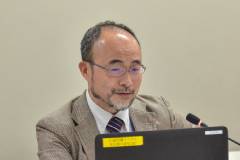
Makino Koji, director general, JICA Ogata Research Institute
Yamaguchi, who served as a moderator, noted that some are concerned about China’s ambition around Taiwan. He asked how likely it is for China, upon seeing with their own eyes how Ukraine is being invaded, to start something similar in Taiwan. Takahara’s answer was that this will not happen for the time being as the greatest priority for President Xi Jinping right now is to maintain his administration and China’s one-party system. He analyzed that the president has likely decided that to maintain his regime, the costs of invading Taiwan outweigh the benefits.
In response to a question on whether the economic sanctions on Russia may have uncontrollable global negative impacts, Tadokoro pointed out that Russia has a huge role as an energy supplier and if their energy supply to Europe is suspended in winter, order within Europe may be disrupted. Such suspension may also lead to Europe’s increased dependence on the Middle East, thereby resulting in Europe’s weakened diplomatic grip on the region. Tadokoro then commented that the most uncertain and largest potential risk is the situation developing into global financial destabilization. On the other hand, he said that it is important to see risks as opportunities, such as for the transition from fossil fuels to green energy.
To another question on whether it is possible to help Ukraine in dealing with unexploded ordnance (UXO), Makino replied that it is extremely important to work on the issue of UXO and landmines. He shared that a Cambodian organization which JICA assisted in the past with measures against landmines has developed to the extent that they are now assisting other countries, and JICA will be coordinating with them to assist Ukraine. He also said that in addition to ongoing emergency assistance such as helping people in Ukraine to survive the winter, international cooperation has important roles in medium- to long-term measures after peace is made, such as restoration and the return of refugees.
Various questions came from the audience including those on the risk of the crisis in Ukraine globally expanding, the roles of the United Nations, China’s assistance activities in Africa, and the spread of nationalism.
Based on these presentations and discussions, Yamaguchi said that IUJ and JICA have been working on how Japan should be involved in the global community through academic research and practical work, while cooperating with each other. He closed the forum by saying that the two institutes would like to continue to develop this cooperation.
IUJ-JICA Ogata Research Institute Knowledge Forum

事業事前評価表(地球規模課題対応国際科学技術協力(SATREPS)).国際協力機構 地球環境部 . 防災第一チーム. 1.案件名.国 名: フィリピン共和国.

事業事前評価表(地球規模課題対応国際科学技術協力(SATREPS)).国際協力機構 地球環境部 . 防災第一チーム. 1.案件名.国 名: フィリピン共和国.

事業事前評価表(地球規模課題対応国際科学技術協力(SATREPS)).国際協力機構 地球環境部 . 防災第一チーム. 1.案件名.国 名: フィリピン共和国.

事業事前評価表(地球規模課題対応国際科学技術協力(SATREPS)).国際協力機構 地球環境部 . 防災第一チーム. 1.案件名.国 名: フィリピン共和国.

事業事前評価表(地球規模課題対応国際科学技術協力(SATREPS)).国際協力機構 地球環境部 . 防災第一チーム. 1.案件名.国 名: フィリピン共和国.
scroll